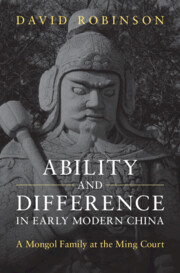Refine search
Actions for selected content:
41 results
Ability and Authority in the Context of Crisis and Conflict: The Mid-Fifteenth Century
-
- Journal:
- Journal of Chinese History / Volume 9 / Issue 2 / July 2025
- Published online by Cambridge University Press:
- 19 September 2025, pp. 286-300
-
- Article
-
- You have access
- Open access
- HTML
- Export citation
4 - Educating the Entitled
-
- Book:
- Ability and Difference in Early Modern China
- Published online:
- 10 September 2025
- Print publication:
- 11 September 2025, pp 82-114
-
- Chapter
- Export citation
9 - Turning Every Page
-
- Book:
- Ability and Difference in Early Modern China
- Published online:
- 10 September 2025
- Print publication:
- 11 September 2025, pp 212-230
-
- Chapter
- Export citation
3 - The Sovereign’s Man
-
- Book:
- Ability and Difference in Early Modern China
- Published online:
- 10 September 2025
- Print publication:
- 11 September 2025, pp 60-81
-
- Chapter
- Export citation
8 - Holding against the Storming
-
- Book:
- Ability and Difference in Early Modern China
- Published online:
- 10 September 2025
- Print publication:
- 11 September 2025, pp 186-211
-
- Chapter
- Export citation
7 - Patronage, Assessment, and Power
-
- Book:
- Ability and Difference in Early Modern China
- Published online:
- 10 September 2025
- Print publication:
- 11 September 2025, pp 163-185
-
- Chapter
- Export citation
Conclusion
-
- Book:
- Ability and Difference in Early Modern China
- Published online:
- 10 September 2025
- Print publication:
- 11 September 2025, pp 247-251
-
- Chapter
- Export citation
1 - An Age of Decisions
-
- Book:
- Ability and Difference in Early Modern China
- Published online:
- 10 September 2025
- Print publication:
- 11 September 2025, pp 23-40
-
- Chapter
- Export citation
10 - Seizing Fortune
-
- Book:
- Ability and Difference in Early Modern China
- Published online:
- 10 September 2025
- Print publication:
- 11 September 2025, pp 231-246
-
- Chapter
- Export citation
Introduction
-
- Book:
- Ability and Difference in Early Modern China
- Published online:
- 10 September 2025
- Print publication:
- 11 September 2025, pp 1-22
-
- Chapter
- Export citation
2 - Dying for His Lord
-
- Book:
- Ability and Difference in Early Modern China
- Published online:
- 10 September 2025
- Print publication:
- 11 September 2025, pp 41-59
-
- Chapter
- Export citation
6 - Far from Home
-
- Book:
- Ability and Difference in Early Modern China
- Published online:
- 10 September 2025
- Print publication:
- 11 September 2025, pp 138-162
-
- Chapter
- Export citation
5 - Representing the Emperor
-
- Book:
- Ability and Difference in Early Modern China
- Published online:
- 10 September 2025
- Print publication:
- 11 September 2025, pp 115-137
-
- Chapter
- Export citation

Ability and Difference in Early Modern China
- A Mongol Family at the Ming Court
-
- Published online:
- 10 September 2025
- Print publication:
- 11 September 2025
Chapter 4 - Who are my students?
- from Part 1 - Introduction to education
-
-
- Book:
- Introduction to Education
- Published online:
- 14 June 2025
- Print publication:
- 02 June 2025, pp 81-106
-
- Chapter
- Export citation
Learning to Open Monty Hall's Doors
-
- Journal:
- Experimental Economics / Volume 6 / Issue 3 / November 2003
- Published online by Cambridge University Press:
- 14 March 2025, pp. 235-251
-
- Article
- Export citation
Willingness to compete, gender and career choices along the whole ability distribution
-
- Journal:
- Experimental Economics / Volume 25 / Issue 5 / December 2022
- Published online by Cambridge University Press:
- 14 March 2025, pp. 1299-1326
-
- Article
-
- You have access
- Open access
- HTML
- Export citation
The Rasch Model, the Law of Comparative Judgment and Additive Conjoint Measurement
-
- Journal:
- Psychometrika / Volume 42 / Issue 4 / December 1977
- Published online by Cambridge University Press:
- 01 January 2025, pp. 631-634
-
- Article
- Export citation
A Note on Keats' Generalization of the Rasch Model
-
- Journal:
- Psychometrika / Volume 41 / Issue 3 / September 1976
- Published online by Cambridge University Press:
- 01 January 2025, pp. 405-407
-
- Article
- Export citation
Chapter 2 - Democratic Eleutheria as Positive Freedom
-
- Book:
- Freedom and Power in Classical Athens
- Published online:
- 04 April 2024
- Print publication:
- 11 April 2024, pp 18-55
-
- Chapter
-
- You have access
- Open access
- HTML
- Export citation
